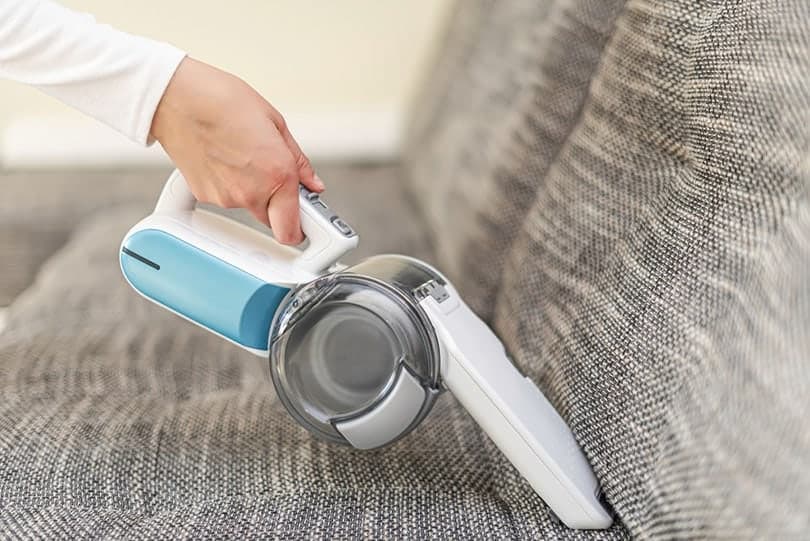Did you know that 15% to 30% of Americans have pet allergies? It’s true, and while cat allergies are roughly twice as common as dog allergies, those who are allergic to dogs often have more severe reactions. You don’t need to resign yourself to a dog-free life if you have pet allergies, however. The key is finding a breed that creates fewer allergens than others.
You may have stumbled across the Goldendoodle, a cross between a Poodle and Golden Retriever breed, and wondered if it could work with your allergies. Goldendoodles are not 100% hypoallergenic, but they are a viable option for allergy sufferers.
Keep reading to find everything you need to know before you consider adopting a Goldendoodle.
What Does “Hypoallergenic” Mean?
Dog breeds are considered hypoallergenic if they are unlikely to trigger an allergic response in the body. Hypoallergenic breeds have hair that won’t shed, so the dander and skin particles that cause allergic reactions won’t slough off.
It might come as a surprise to some readers that it is very rare for any individual to be allergic to dog hair or fur. It is the dander from the dogs’ skin particles that cause allergic reactions.
Are Goldendoodles a Good Choice for People with Dog Allergies?
Goldendoodles are not 100% hypoallergenic by definition as they do produce dander. It is important to note that no dog breed is 100% hypoallergenic, though. Some people believe certain breeds can be hypoallergenic, though, as they do not produce much of the dander and dead skin particles that humans are allergic to.
Goldendoodles are a crossbreed, so their hypoallergenic properties will depend upon the generation they’re coming from. Generally speaking, the more poodle genes a Goldendoodle has, the more hypoallergenic they will be.
If you’re shopping around for a Goldendoodle that won’t make your allergies flare up too much, keep your eyes peeled for a puppy with wavy or curly hair that doesn’t shed when you pet it.

What Causes Dog Allergies?
The job of the immune system is to find foreign substances and get rid of them. This response is absolutely necessary as it protects us from dangerous diseases, but it can be an annoyance for pet lovers with oversensitive immune systems. When these people come into contact with pet allergens, they’ll experience an allergic reaction.
Dogs secrete proteins that wind up in their dander, urine, and saliva. It is these proteins that cause the allergic reaction. The allergens collect on surfaces throughout the home and will stay quite potent for some time. They can cling to walls, clothing, and furniture for months. It’s even possible for pet-less homes to have allergens present as they can be carried on people’s clothing.
Can I Minimize Allergies Caused by a Goldendoodle?
If you already have your heart set on a Goldendoodle although they’re not 100% hypoallergenic, there are some steps you can take to make your new pooch easier on your allergies.
Grooming
Grooming your dog regularly can help remove the allergy-causing dander. Regular brushings will extract any dirt, loose hairs, or dander from their fur. Bathing is great for removing dander, too. Aim to bathe your pooch at least twice a month using a shed-control shampoo. You should also make regular appointments with your dog’s groomer to keep his fur length in check.
Clean More Often
Cleaning your home more often when you have an allergy-causing pet is a necessity.
When you’re vacuuming, wear a dust mask to reduce how many allergens you’re breathing in. Vacuuming stirs up allergens that have settled into places like your carpet, flooring, or walls so the mask will create a barrier between your respiratory system and those allergens.
Low pile carpets are better than those with a medium or high pile as the dander won’t have as many spots to hide. You should commit to steam cleaning it often to remove any allergens that have found their way into the carpet fibers.

Try Medication
There are plenty of medications you can buy over-the-counter such as antihistamines, decongestants, and nasal sprays that might help combat some of your allergy symptoms.
If you’re working with an allergist, they may recommend immunotherapy. This will expose you to the animal protein that causes your allergic reaction to help your body become less sensitive to it over time.
Conclusion
Can Goldendoodles and pet-allergy sufferers live together in harmony? Potentially, depending on how much poodle your Goldendoodle has in his genetics and how severe your allergy is.
Featured Image Credit: Shutterstock














